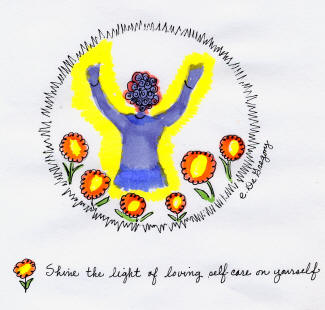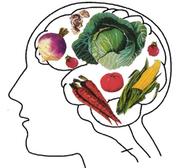Discover How to Develop a Loving, Self-Nurturing, Inner Voice For You!
By Bob Wilson BS, DTR

How did I break down my emotional walls? I developed my own kind “internal mother” voice.
Just like a baby or child crying, you pay attention. How did I learn to do this?
In the past I had learned to be an excellent caregiver to my family and classmates but I didn't know how to love and care for myself!
One of the most difficult things for me to do was to love me—in practice. To admit I was emotionally unhealthy—that I needed help. To take care of MY NEEDS required spending time on me! I finally HAD to put my needs on the list—first things first—and slow down and stop fixing everyone else. THAT was hard to do.
A day at a time, I'm falling in love with myself AS I AM. I'm respecting myself and treating myself with gentleness. I'm no longer willing to harm myself for ANYone or ANYthing.
When I find myself experiencing deep inner suffering, distress, or overwhelm, I pause and tune within and ask myself what is going on. I use loving self-talk and ask myself, what do I need to feel better?
When a baby cries, you pay attention.

Embrace your pain and confusion as a loving mother would toward her child.
Talk with yourself:
Oh, sweetheart, what is the matter? What do you need? I am here for you.
I will not abandon you and I love you.
I hear that you are in pain. Can you tell me about it? Take your time.
Let me know when you are ready. I don’t want to rush you or invalidate your feelings.
I will always be here for you.
So, let me know what hurts. Is there anything I can do to help?
To find a printer-friendly version (PDF): Develop Inner Nurturing Voice.pdf
When no one is around and I NEED a HUG—I wrap my arms around ME and give myself a HUG! I sprinkle dollops of delight and self-care towards myself. I tell myself, "I love you, Bobby Sweetheart. You are wonderful!"
Sprinkle Dollops of Delight and Self-Care Towards Yourself.
Oh, Dearest, you are wonderful! I love you! (For a larger version)

I love you as you are and as you are not.
This felt very odd and unnatural at first. But I thought that if I could hit me over the head and wish me dead—as I had done on many times before, then I could certainly give myself a hug and a kiss; just as I would to a loving friend.
When we find ourselves experiencing strong emotions remember, where we're at is where we're at! You or I can’t be anywhere else. So, just start there!
We start with touching our suffering—the things that hurt. When intense feelings come up, tune within and explore.

The process is summarized in the following FIVE STEPS:
Step I: Recognize it—observe it—notice that something is wrong. Something hurts. You don’t know what it is, so you check it out.
Step 2: Accept it and look deeply—you do not deny it; you accept whatever is present.
Step 3: Embrace it—your mindfulness (awareness) embraces your situation and your feelings—without judging yourself. You just notice, and are present with, whatever arises.
Step 4: Then evaluate it—what is causing it? Is it physical, emotional? Just like a doctor that evaluates an illness, we tune-in to ourselves and notice the symptoms. What patterns do you have in your life that are causing the distress? Notice your habits.
Step 5: The suffering needs to be understood. Encourage yourself to look deeply into your suffering and distress—recognize its nature. You do this by seeing how it came about.
What nutrients (daily choices) are creating and sustaining it? Notice—be mindful of— which nutrients are creating the symptoms that you are presently experiencing?

· Food nutrients? What you eat or drink can bring about distress in your body and mind. Do you cook and shop and eat with awareness? Just notice.
· Sense nutrients? Sights, sounds, smells, tastes, feelings of body or thoughts of mind? You are always in constant contact with sense objects. They are food for your mind and emotions. Notice if certain objects stimulate your cravings and misery.
· Intention/Motivation nutrients? Choose to be aware of what motivates you. What do you think will bring you happiness? Wealth, fame, career, a mate? Do those things really bring lasting happiness? Consider exploring Make Your Mind An Ocean: Become Your Own Therapist!
· Nutrients stored in our subconscious? Your past actions—all of your habits of body, speech, and mind are stored in your subconscious. Through repetition, these choices become unconscious and automatic. Which habits for you are creating the problems? Refer to the Horse of Habit Story and Patterns, Patterns, Everywhere! Not a Moment's Peace!
So practice the path towards well-being. After you identify the kinds of nutrients that have been feeding your pain and distress, then simply stop ingesting them! We can't expect our difficulties to go away by themselves. We have to DO certain things and NOT DO other things. As we resolve to stop making choices that harm us and others and to start making healthier choices (to plant the garden of our lives with seeds of well being), we start following the path towards well-being. Gradually well-being increases and our problems diminish. Ah...
Adapted from Heart of the Buddhas Teachings by Thich Nhat Hahn, pp. 31- 44.
How Can You Begin to Make Changes?

Part of the root of my depression and low self-esteem came from having delight deficiency syndrome. I didn’t take enough time to care for my soul and spirit in nurturing ways. I found that deep down I didn’t feel worthwhile.
For me, applied self-esteem was learning how to take time for activities that fill up my well of reserve; so from that well, I then take time to help others.
For me the daily practice of self-nurturing includes:
· Preparing yummy meals and snacks,
· Bringing a food bag with me
· Taking time for loving social connections
· Finding fun ways to be active on a regular basis
· Taking time to provide a rich treasure chest of nurturing activities for me.
· Making time for daily prayer and meditation and retreats on a regular basis
· Keeping my life in enough balance so that I can regularly apply all of these ideas.

Learn the skills for emotional nurturing. They're euphoric and non-caloric! Learning and practicing these skills will help to transform emotional eating.
Investigate Emotional Eating, Do You Experience a RAIN of Feelings?, Bob's Story The Emotional Area and Life-Long Companion for additional suggestions for self-embracing and self-honoring. Also please visit links below!
- If You Would Grow
- Shine The Light of Self-Care on Yourself to Transform Inner Pain!
- Sprinkle Dollops of Delight and Self-Care Towards Yourself
- Home Coming: Reclaiming and Championing Your Inner Child & Healing Adverse Childhood Experiences
- Mental Nutrients: What To Say When You Talk To Your Self
- My Favorite Things!
- CELEBRATING The Simple Joys Of Life!
- Ideas for Self-Nurturing
- An Alphabetical Guide to Zestful Living
- Radiate Your Light and Love to the World!
- Gratitude List
- Be Happy!
- Nourishing Affirmations!
- How to Work With Food Cravings